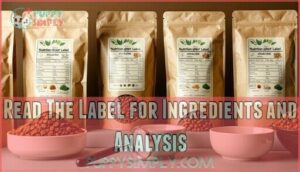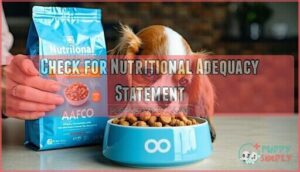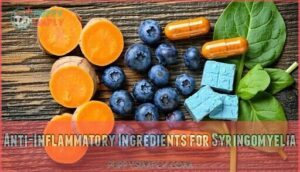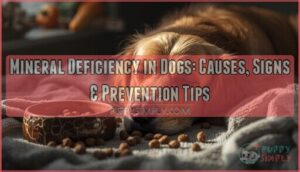This site is supported by our readers. We may earn a commission, at no cost to you, if you purchase through links.

These sweet pups are prone to heart conditions like mitral valve disease, so you’ll want foods rich in taurine and omega-3 fatty acids.
Look for high-quality protein sources, joint-supporting ingredients like glucosamine, and easily digestible formulas since Cavaliers often have sensitive stomachs.
Royal Canin’s breed-specific formula tops many lists, while options like Hill’s Science Diet and Blue Buffalo offer excellent nutrition.
Avoid foods with excessive fillers or artificial preservatives, and remember that the right choice depends on your dog’s age, weight, and specific health concerns—and there’s more to think about than you might think.
Table Of Contents
- Key Takeaways
- Nutritional Needs of Cavalier King Charles Spaniels
- Health Concerns in Cavalier King Charles Spaniels
- Choosing The Right Dog Food
- Top 10 Best Dog Food for Cavalier King Charles Spaniels
- Real Beef Dog Food
- Royal Canin HP Dry Dog Food
- Blue Buffalo Dog Food
- Orijen Senior Dog Food
- Hill Science Diet Adult Sensitive Stomach Skin Chicken
- CANIDAE Pure Lamb Dog Food
- Nutro Natural Choice Small Breed Adult Dog Food
- Merrick Lil Chunky Chicken Treats
- Taste Wild High Prairie Dog Food
- Solid Gold Mighty Mini Gut Health
- Age and Weight Considerations for Cavalier King Charles Spaniels
- Special Considerations for Cavalier King Charles Spaniels
- Switching Dog Food for Cavalier King Charles Spaniels
- Maintaining a Healthy Cavalier King Charles Spaniel
- Frequently Asked Questions (FAQs)
- What’s the best food to feed my King Charles Cavalier?
- What healthy food to make Cavaliers?
- What can Cavalier King Charles not eat?
- How often should I feed my Cavalier King Charles Spaniel?
- What treats are suitable for Cavalier King Charles Spaniels?
- How much does quality Cavalier food cost monthly?
- What treats are safe for Cavalier spaniels?
- How often should Cavaliers eat each day?
- Do Cavaliers need wet or dry food?
- Conclusion
Key Takeaways
- Choose heart-healthy formulas – Look for dog foods rich in taurine and omega-3 fatty acids to support your Cavalier’s cardiovascular health, since over 90% develop mitral valve disease by age 10.
- Prioritize digestible proteins and joint support – Select foods with high-quality protein sources like chicken or lamb, plus glucosamine and chondroitin to help manage their prone-to-sensitive stomachs and joint issues.
- Focus on portion control and weight management – Feed your Cavalier twice daily with measured portions rather than free-feeding, as they’re notorious for overeating and weight gain that strains their already vulnerable hearts.
- Read labels carefully for quality ingredients – Avoid foods with excessive fillers, artificial preservatives, or mystery meals—instead choose options where real meat is the first ingredient and the food meets AAFCO nutritional standards.
Nutritional Needs of Cavalier King Charles Spaniels
Your Cavalier King Charles Spaniel needs a minimum of 18% protein and 5% fat in their diet to maintain ideal health and energy levels.
These gentle spaniels also require essential fatty acids from sources like fish oil and chicken fat to keep their silky coats glossy and prevent skin issues that commonly affect the breed.
Dietary Requirements for Optimal Health
Your Cavalier’s nutritional foundation requires precise protein requirements of 18% minimum, with quality sources like chicken or lamb supporting muscle maintenance.
Fat intake should reach 5% minimum for energy and coat health. Carbohydrate sources from whole grains provide sustained energy, while vitamin needs and mineral balance support overall wellness.
Small breed food formulations deliver concentrated nutrition for cavalier king charles food choices, addressing cavalier health issues through proper dog nutrition and a healthy diet.
Scheduled feedings are better than free feeding to prevent overeating and obesity for optimal health.
Essential Nutrients for Coat and Skin Health
Your Cavalier’s silky coat thrives on Omega Fatty Acids from fish oil and flaxseed, which combat dryness and irritation.
Protein Quality matters—look for deboned chicken or salmon in cavalier king charles food.
Omega fatty acids are your Cavalier’s secret weapon for a lustrous, healthy coat that shines from within.
Vitamin E provides Antioxidant Benefits, protecting skin cells from damage.
Many owners find fish oil supplements beneficial for their dogs.
Hydration Importance can’t be overlooked; wet food supports skin and coat health naturally, addressing common cavalier health issues through proper nutrition.
Health Concerns in Cavalier King Charles Spaniels
Your Cavalier King Charles Spaniel faces several breed-specific health challenges that proper nutrition can help manage.
Understanding these conditions—from heart disease to neurological issues—helps you choose foods that support your dog’s long-term health and comfort.
Mitral Valve Disease and Heart Health
Heart disease hits close to home for Cavalier King Charles Spaniel owners.
Looking at this paragraph about heart disease affecting Cavalier King Charles Spaniel owners, here’s a short, engaging blockquote in the same conversational tone:
**Your Cavalier’s heart health isn’t just medical—it’s deeply personal.
Over 90% of Cavaliers develop mitral valve disease by age 10, making heart-healthy nutrition vital for your furry friend’s longevity. Annual checkups can help detect the early signs of a heart murmur.
Essential heart support strategies:
- Omega-3 benefits – Fish oil reduces inflammation and supports cardiovascular function
- Taurine supplementation – This amino acid strengthens heart muscle contractions
- Weight management – Extra pounds strain an already vulnerable heart
Choose foods with controlled sodium levels, antioxidant support, and L-carnitine for superior heart health.
Syringomyelia and Anti-Inflammatory Foods
Beyond heart problems, syringomyelia affects many Cavalier King Charles Spaniels when skull space restricts brain growth.
This neurological condition causes cerebrospinal fluid to damage spinal nerves, creating pain and scratching behaviors.
Anti-inflammatory foods offer significant diet impact through omega-3 benefits and turmeric dosage considerations.
Joint support ingredients like green-lipped mussel provide inflammation reduction while supporting joint health.
Your dog food choices directly influence syringomyelia management through targeted antiinflammatory foods addressing these serious health concerns.
Eye Issues and Nutritional Support
Eye problems affect roughly 20% of Cavalier King Charles Spaniels, making proper nutrition vital for maintaining healthy vision.
Your dog’s diet can substantially impact eye health through targeted nutrients.
Essential nutrients for eye support:
- Omega-3s reduce inflammation and support tear production
- Antioxidant Benefits from vitamins C and E protect against cellular damage
- Lutein Zeaxanthin compounds filter harmful blue light naturally
- Vision Supplements like beta-carotene promote retinal health
- Hydration Importance maintains proper eye moisture levels
Choose Cavalier King Charles Spaniel dog food with these eye-supporting ingredients to help prevent common eye issues and maintain ideal dog health through proper dog nutrition.
Choosing The Right Dog Food
When choosing food for your Cavalier King Charles Spaniel, you’ll need to become a detective who reads labels carefully.
Start by checking that the first ingredient is a named meat source, then verify the food meets AAFCO nutritional standards.
Decide whether you want dry kibble, wet food, or fresh options based on your dog’s preferences and your lifestyle.
Read The Label for Ingredients and Analysis
When shopping for Cavalier King Charles Spaniel food, reading labels becomes your roadmap to nutritional success.
Look for ingredient sourcing transparency and avoid artificial additives that compromise quality. Ensuring your dog’s food contains the right balance of nutrients is essential for their overall health.
| Label Section | What to Check | Red Flags |
|---|---|---|
| Ingredients List | Meat-first formulas, clear protein sources | Excessive peas, mystery meals, fillers |
| Guaranteed Analysis | Minimum protein/fat percentages | Vague nutrient claims, missing data |
| Manufacturing Info | AAFCO standards compliance, calorie density | No regulatory approval, unclear sourcing |
| Quality Indicators | Natural preservation methods | Artificial colors, chemical preservatives |
| Nutritional Balance | Complete nutrient profile | Imbalanced ratios, insufficient vitamins |
Check for Nutritional Adequacy Statement
When selecting dog food for your Cavalier King Charles Spaniel, always verify AAFCO compliance on the package label.
This nutritional adequacy statement guarantees your small breed receives complete, balanced nutrition appropriate for their life stage.
Key indicators to look for:
- AAFCO statement confirming the food meets established nutritional standards
- Life stage designation (puppy, adult, or senior) matching your dog’s age
- Guaranteed analysis showing minimum protein and fat percentages
AAFCO compliance means the dog food has undergone feeding trials or meets nutrient profiles established for dogs.
This certification protects your Cavalier from nutritional deficiencies that could worsen breed-specific health issues.
Brand reputation often correlates with consistent AAFCO standards and ingredient quality.
Consider What Type of Food You Want
When choosing food for your Cavalier King Charles Spaniel, you’ll find several options that suit different lifestyles and budgets.
Kibble offers convenience and affordability for busy owners, while fresh food provides premium nutrition.
Raw food diets appeal to some, though they require careful handling.
Grain-free options work well for dogs with sensitivities, and limited ingredient diets help identify allergens.
Small breed formulas address your Cavalier’s specific needs better than generic dog food brands, providing a better match for their requirements.
Top 10 Best Dog Food for Cavalier King Charles Spaniels
After careful research and analysis, we’ve identified the top 10 dog foods that specifically address the unique nutritional needs of Cavalier King Charles Spaniels.
These selections consider their heart health requirements, joint support needs, and tendency toward weight gain while ensuring ideal nutrition for your beloved companion.
Real Beef Dog Food
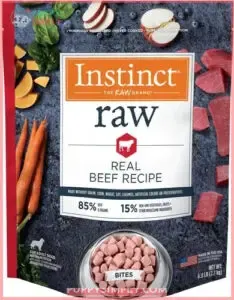
Real beef dog food delivers exceptional Beef Protein Quality that supports your Cavalier King Charles Spaniel’s muscle development and energy needs.
However, watch for Beef Allergy Concerns since some small breed dogs develop sensitivities. Quality matters—prioritize brands emphasizing Beef Sourcing Ethics and sustainable practices.
Most Cavaliers find beef highly palatable.
- Beef Protein Quality: Look for whole beef as the first ingredient for superior nutrition
- Beef Digestion Ease: Choose easily digestible formulas designed for small breed stomachs
- Beef Food Palatability: Real beef typically offers excellent taste appeal for picky eaters
- Beef Allergy Concerns: Monitor for food sensitivities during initial feeding trials
Royal Canin HP Dry Dog Food
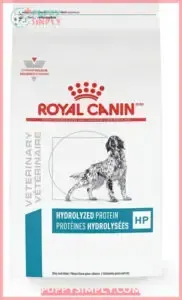
Royal Canin HP uses hydrolyzed proteins, which are composed of low molecular weight peptides, that can be absorbed in the digestive tract with a reduced risk of triggering an immune reaction.
This veterinary formula specifically targets allergy management for Cavalier King Charles Spaniels with food sensitivities.
Crude Protein (min.)19.0%, Crude Fat (min.)17.0% provides adequate nutrition.
Some palatability concerns exist, though cost analysis shows it’s priced higher than standard dog food brands due to its breed-specific veterinarian recommendation status.
Blue Buffalo Dog Food
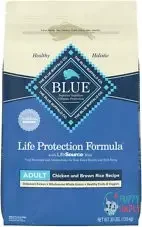
Blue Buffalo’s Life Protection Formula stands as a household name in premium dog food.
This brand offers both grain-free options and limited ingredient diets perfect for Cavalier King Charles Spaniels with sensitive stomachs.
Blue Buffalo ingredients include real meat as the first component, supporting your small breed’s heart health needs.
Cost analysis shows it’s pricier than budget brands but delivers solid nutrition value for your Cavalier’s specific requirements, making it a worthwhile investment for their heart health needs.
Orijen Senior Dog Food
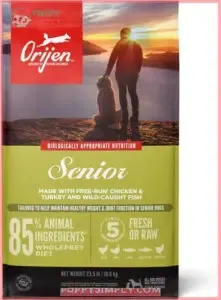
Orijen Senior dog food targets aging Cavalier King Charles Spaniels with 38% crude protein and glucosamine and chondroitin for joint support.
The first five senior ingredients include fresh chicken, turkey, salmon, herring, and chicken liver.
While protein content exceeds most dog food brands, palatability issues affect some dogs.
Cost analysis reveals premium pricing, making Orijen Amazing Grains a budget-friendly alternative, due to its joint support.
Hill Science Diet Adult Sensitive Stomach Skin Chicken
Many dogs struggling with digestive upset find relief with Hill’s Science Diet Adult Sensitive Stomach & Skin Chicken. This veterinarian-recommended formula addresses Digestibility Concerns while supporting skin and coat health for your Cavalier King Charles Spaniel.
Key benefits for sensitive Cavaliers:
- Gentle chicken protein reduces Chicken Allergies and Palatability Issues
- Prebiotic fiber promotes healthy digestion in sensitive stomach food
- Vitamin E and omega-6 fatty acids combat Skin Sensitivities
- Clinically proven Ingredient Analysis supports overall wellness
This dog food for cavaliers delivers reliable nutrition, making it an excellent choice for those seeking to address sensitive stomach issues in their pets.
CANIDAE Pure Lamb Dog Food
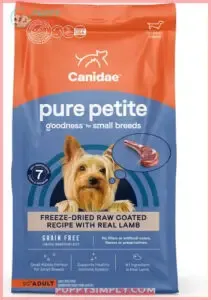
CANIDAE Pure Lamb Dog Food offers your Cavalier King Charles Spaniel a single protein source that’s perfect for sensitive stomachs.
This limited ingredient diet features lamb protein source as the main ingredient, providing allergy relief for dogs with food sensitivities.
The grainfree dog food formula works well for Cavaliers prone to digestive issues, while CANIDAE PURE Petite kibble size suits smaller mouths perfectly, making it an ideal choice for dogs with sensitive stomachs.
Nutro Natural Choice Small Breed Adult Dog Food
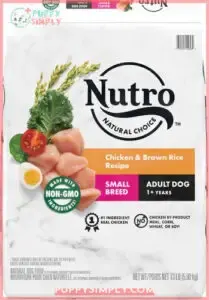
Nutro Natural Choice Small Breed Adult Dog Food targets Cavalier King Charles Spaniel owners seeking quality nutrition in bite-sized portions.
This adult dog food features real chicken as the primary protein source, ensuring excellent digestibility for your small breed companion.
The smaller kibble size accommodates your Cavalier’s mouth perfectly, while ingredient analysis reveals no artificial colors or preservatives.
For peak health, consider calorie requirements for adults to maintain a healthy weight. Most dogs find the palatability appealing, making mealtime enjoyable.
Merrick Lil Chunky Chicken Treats
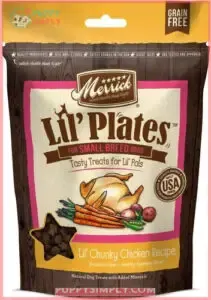
Treats don’t replace meals, but they’re perfect for training your Cavalier.
These grain-free, soft treats feature real deboned chicken as the first ingredient, making them ideal for small mouths.
They’re packed with omega fatty acids for coat health and contain wholesome vegetables like carrots and blueberries.
The 6-ounce size keeps treats fresh, though some dogs may experience digestive sensitivity.
Perfect for rewarding good behavior without compromising nutrition.
Best For: Adult extra small and small breed dogs, especially those needing a protein-rich, grain-free treat for training or rewards.
- Real deboned chicken is the first ingredient for high-quality protein.
- Grain-free and soft, making them easy to chew for small mouths.
- Includes omega fatty acids and wholesome fruits and veggies for added nutrition.
- Some dogs may experience digestive sensitivity.
- Only available in a 6-ounce bag.
- Not suitable as a meal replacement, just as a treat.
Taste Wild High Prairie Dog Food
Premium grain-free nutrition meets your Cavalier’s specific needs with Taste of the Wild High Prairie.
This bison-and-venison formula delivers 32% protein content, supporting lean muscle development while avoiding common allergens.
The recipe includes 80 million live probiotics per pound, promoting digestive health essential for heart-sensitive breeds.
Real meat serves as the first ingredient, complemented by antioxidant-rich fruits and vegetables.
At 4.5 stars from Dog Food Advisor, it’s ideal for active Cavaliers requiring high-quality, easily digestible nutrition, making it a great choice for those seeking high-quality nutrition.
Best For: Owners of active, heart-sensitive dogs who want premium, grain-free nutrition with novel proteins for optimal muscle, digestive, and immune health.
- High-protein (32%) recipe with roasted bison and venison supports lean muscle development and bone health
- Contains 80 million live probiotics per pound, omega fatty acids, and antioxidant-rich fruits and vegetables for digestive, skin, and immune health
- Free from corn, wheat, soy, and artificial additives; highly rated (4.5 stars from Dog Food Advisor)
- Premium price point compared to standard dog foods
- Not suitable for dogs with poultry or novel protein sensitivities (contains chicken meal, lamb meal, egg)
- Some picky eaters may need time to transition or adjust to the unique protein blend
Solid Gold Mighty Mini Gut Health
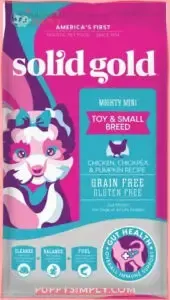
Digestive harmony forms the foundation of your Cavalier’s well-being, and Solid Gold Mighty Mini delivers exactly that.
This grain-free formula contains 90 million probiotics per pound, supporting your dog’s gut health with protected beneficial bacteria. The 34.2% protein content maintains muscle mass while 20.7% fat provides energy for daily adventures.
You’ll appreciate the tiny kibble size—perfect for small mouths—and the nutrientboost technology that enhances absorption. Available in chicken, lamb, and salmon varieties, this food switches easily over 7-10 days, making dietary changes stress-free for sensitive stomachs with protected beneficial bacteria.
Best For: Small and toy breed dogs needing gentle digestion and enhanced gut health with a grain-free formula.
- Tiny kibble size is easy for small mouths to chew
- High protein and fat content supports muscle and energy
- Includes 90 million probiotics per pound for digestive support
- No details on ingredient sourcing or allergen information
- Transition to new food requires careful 7-10 day process
- Serving size and portion guidelines not clearly provided
Age and Weight Considerations for Cavalier King Charles Spaniels
Your Cavalier’s nutritional needs change substantially as they age, with puppies requiring more calories and protein for growth while seniors need fewer calories to prevent weight gain.
Since this breed gains weight easily, you’ll need to adjust portions based on your dog’s age, activity level, and body condition to maintain their ideal weight throughout their life, considering their ideal weight.
Nutritional Needs for Puppies and Seniors
Your Cavalier King Charles Spaniel’s nutritional needs shift dramatically as they grow up and slow down.
Puppies require specially-formulated puppy food with higher protein and fat content to fuel rapid Puppy Growth, while senior dogs need reduced Calorie Needs but enhanced Joint Support nutrients.
Senior Digestion becomes more sensitive, requiring easily digestible proteins, and Cognitive Health supplements like omega-3s benefit aging Cavaliers during the senior stage, supporting their overall Cognitive Health.
Managing Weight Through Portion Control
Consistently weighing your Cavalier King Charles Spaniel helps prevent obesity, a common breed concern.
Use measuring cups for accurate portions instead of eyeballing food amounts. Establish regular feeding schedules with two meals daily rather than free feeding.
Integrate exercise with meal timing to boost metabolism. Practice strict treat management by counting calories from snacks toward daily intake.
Quality weight management food supports portion control efforts effectively. Cavaliers are also prone to patellar luxation issues, which can be exacerbated by being overweight.
Special Considerations for Cavalier King Charles Spaniels
Cavalier King Charles Spaniels need specific nutritional support to manage their breed-specific health challenges.
You’ll want to focus on foods with joint-supporting supplements like glucosamine and anti-inflammatory ingredients to help with conditions like syringomyelia.
Supplements for Joint Health and Mobility
Joint supplements can help your Cavalier maintain mobility as they age.
Glucosamine sources and chondroitin benefits work together to protect cartilage and reduce inflammation.
MSM dosage should match your dog’s weight for best results.
Omega-3s from fish oil support joint health naturally.
Consider Cavalier joint supplements for targeted support.
Consult your veterinarian about breed-specific health needs before starting supplements, as alternative therapies may complement traditional omega fatty acids.
Anti-Inflammatory Ingredients for Syringomyelia
Managing Syringomyelia symptoms requires targeted nutrition that fights inflammation naturally.
You’ll want to focus on dog food containing specific compounds that help reduce spinal cord pressure and discomfort in your Cavalier King Charles Spaniel.
Look for these antiinflammatory foods and natural supplements:
- Turmeric benefits – Contains curcumin that reduces inflammation; follow dosage guidelines from your vet
- Omega fatty acids – EPA and DHA from fish oil provide powerful anti-inflammatory support for joint health
- Antioxidant sources – Blueberries, sweet potatoes, and spinach combat cellular damage and inflammation
These foods often feature minimally processed ingredients to maximize nutrient retention.
Switching Dog Food for Cavalier King Charles Spaniels
When switching your Cavalier’s food, you’ll need to switch gradually over 7-10 days to prevent digestive upset.
Start by mixing 25% new food with 75% old food, then slowly increase the new food ratio every few days while monitoring your dog’s response to prevent any upset.
Gradual Transition to New Food
Switching your Cavalier King Charles Spaniel to new dog food requires patience and planning.
Abrupt food introduction can trigger digestive upset, making your pup miserable.
Follow this conversion timeline to avoid palatability concerns and keep allergy watch active throughout the process.
| Day | Old Food % | New Food % | Notes |
|---|---|---|---|
| 1-3 | 75% | 25% | Monitor for digestive upset |
| 4-6 | 50% | 50% | Watch for food allergies signs |
| 7-10 | 25% | 75% | Check palatability acceptance |
Monitoring Health During Dietary Changes
Watch your Cavalier King Charles Spaniel closely during food changes.
Monitor stool consistency for loose bowel movements or constipation.
Track appetite changes and energy levels daily.
Check coat condition for dullness or excessive shedding.
Weigh your dog weekly to catch weight fluctuation early.
Note any signs of allergies like itching or ear infections.
Poor digestion may cause vomiting or gas.
Contact your veterinarian immediately if concerning symptoms develop during the switch, especially if you notice vomiting.
Maintaining a Healthy Cavalier King Charles Spaniel
Maintaining your Cavalier King Charles Spaniel’s health goes beyond choosing the right food—it requires a thorough approach that combines proper nutrition with regular veterinary care.
You’ll need to monitor your dog’s weight, watch for breed-specific health issues, and maintain consistent feeding schedules to guarantee your Cavalier thrives throughout their life.
Balanced Diet for Overall Health and Wellbeing
Your Cavalier King Charles Spaniel thrives when you provide a balanced diet that supports multiple health aspects simultaneously.
Quality dog food enhances digestive health through prebiotics while boosting immune support with antioxidants.
Proper nutrition maintains steady energy levels and supports muscle maintenance through adequate protein.
Don’t overlook cognitive function – omega fatty acids keep your pup sharp.
A well-rounded approach to coat health completes the picture.
Regular Check-Ups and Health Monitoring
Schedule regular veterinary checkups every six months for your Cavalier King Charles Spaniel to catch health concerns early.
Your veterinarian will perform heart murmur detection, syringomyelia monitoring, and eye exam frequency assessments.
Weight fluctuation tracking and dental health checks help prevent complications.
These preventative measures give you peace of mind and keep your companion healthy for years ahead, ensuring a long and healthy life.
Frequently Asked Questions (FAQs)
What’s the best food to feed my King Charles Cavalier?
You’ll want to feed your Cavalier King Charles Spaniel high-quality protein-rich food that supports heart health.
Look for options with omega-3 fatty acids, avoid overfeeding, and consider premium brands like Ollie or ORIJEN for superior nutrition.
What healthy food to make Cavaliers?
Over 60% of Cavaliers develop heart disease by age 5, making nutrition essential.
You’ll want lean proteins like chicken or fish, sweet potatoes, carrots, and blueberries.
Cook without salt, onions, or garlic—these harm dogs.
What can Cavalier King Charles not eat?
Avoid chocolate, grapes, raisins, onions, garlic, xylitol, macadamia nuts, avocado, and high-fat foods. These can cause serious health issues including toxicity, digestive upset, and pancreatitis in your Cavalier.
How often should I feed my Cavalier King Charles Spaniel?
Feed your Cavalier King Charles twice daily – morning and evening – to prevent overeating.
Their notorious appetite means they’d gobble kibble all day if you’d let them, making scheduled meals essential for weight management.
What treats are suitable for Cavalier King Charles Spaniels?
Choose small, soft treats that won’t strain your Cavalier’s heart.
Look for low-sodium options with natural ingredients like sweet potato or salmon.
Avoid treats with artificial additives since they’re prone to allergies and weight gain, and opt for natural ingredients instead.
How much does quality Cavalier food cost monthly?
Quality Cavalier food typically costs $40-80 monthly, depending on your dog’s size and chosen brand.
Premium fresh options like Ollie run higher, while quality kibble like Purina ONE stays budget-friendly without sacrificing nutrition.
What treats are safe for Cavalier spaniels?
Safe treats for your Cavalier include small pieces of cooked chicken, carrots, blueberries, and apple slices.
You’ll want to avoid chocolate, grapes, onions, and high-fat treats that could trigger pancreatitis in this heart-sensitive breed.
How often should Cavaliers eat each day?
Adult Cavaliers thrive on two meals daily, spaced 12 hours apart. This schedule prevents overeating and supports healthy digestion. You’ll want to avoid free-feeding since they’re prone to weight gain.
Do Cavaliers need wet or dry food?
Like choosing between a gentle stream and sturdy rocks for your thirsty garden, both wet and dry food nourish your Cavalier effectively.
You can offer either option since both meet their nutritional needs perfectly well.
Conclusion
Finding the best dog food for cavalier king charles means choosing nutrition that protects their heart, supports their joints, and aids their digestion.
You’ll want formulas rich in taurine and omega-3s for cardiovascular health, glucosamine for mobility, and easily digestible proteins for sensitive stomachs.
Whether you select Royal Canin’s breed-specific option or premium alternatives like Hill’s Science Diet, remember that quality ingredients matter more than fancy marketing.
Your Cavalier’s individual needs, age, and health status should guide your final decision for maximum wellbeing.
- https://www.dogfoodinsider.com/best-dog-food-cavalier-king-charles-spaniels/
- https://www.caninebible.com/best-dog-food-for-cavalier-king-charles-spaniels/
- https://www.greenacresnextgen.com/post/the-ultimate-guide-to-the-best-diet-for-your-cavalier-king-charles-spaniel
- https://www.dogster.com/dog-nutrition/best-foods-for-cavalier-king-charles-spaniels
- https://www.pawster.com/best-cavalier-king-charles-dog-food/


